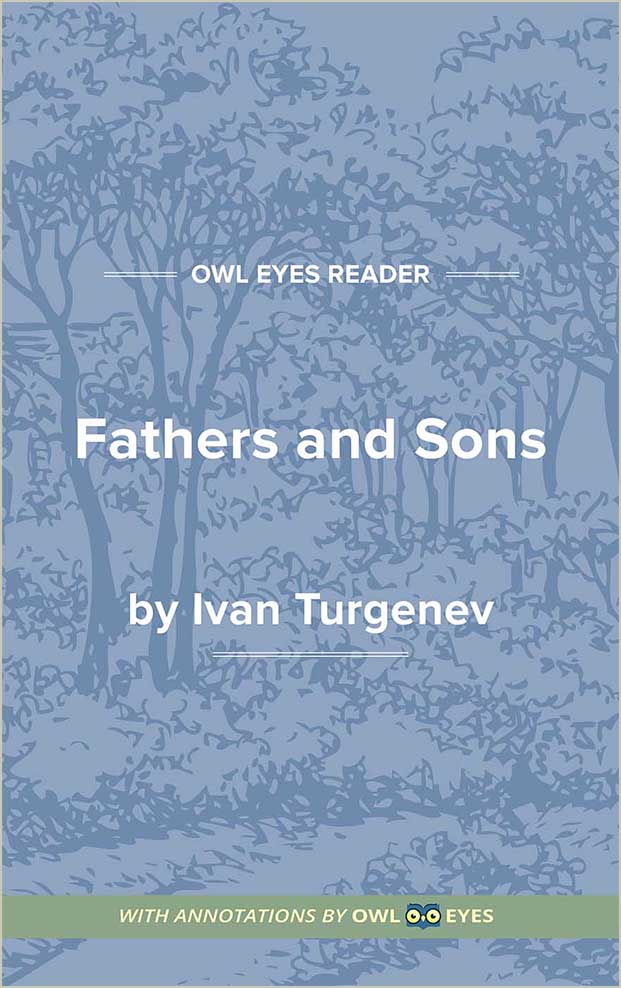Analysis Pages
Literary Devices in Fathers and Sons
Narration: The narrator of Fathers and Sons is a third-person omniscient voice, the standard of the 19th-century novel. While the narrator has no personal bearing in the events of the story, it weaves subtly between the external plot and the complex internal landscapes of the characters. Perhaps the most distinctive feature of the novel’s narration is the tendency towards occasional maxims. From time to time we are taken aside for brief musings about the nature of time, death, and love. In Turgenev’s hands, these musings delight more than they distract.
Allusion: Much of the conflict in Fathers and Sons is intellectual in nature. Throughout the story, the heated discussions over ideas produce numerous allusions. The ideas at the heart of the story are difficult to grasp without an understanding of the historical figures and movements alluded to by the characters. For example, a single conversation in Chapter X contains references to figures such as Büchner, Pushkin, Raphael, and Elijah, as well as movements such as romanticism and materialism. As wide-ranging as the allusions are, it is necessary to understand them in order to grasp the intellectual differences between Bazarov, Arkady, Nikolai, and Paul.
Tragedy & Comedy: Fathers and Sons is unique in the way it employs both tragedy and comedy. Tragedy is a dramatic structure first articulated by Aristotle. In a tragedy, the protagonist moves through the world hindered by a hamartia, an unseen psychological flaw. The protagonist makes a series of errors as a result of this flaw and spirals into chaos. The protagonist recognizes the hamartia after it is too late and generally dies at the end of the story. An Aristotelian comedy is a dramatic structure which revolves around fortune and romance. The protagonist learns a series of lessons, develops in character and status, and finds a romantic partner by the end of the story. The two main characters of Fathers and Sons, Bazarov and Arkady, follow these two separate dramatic paths.
Juxtaposition: There are two major sets of juxtaposition in Fathers and Sons. Typically juxtaposition is used to highlight the contrasts or similarities between two characters or ideas. This can be seen in both Arkady’s idea of a good life as compared with Bazarov’s and Bazarov’s futile pursuit of Anna as similar to Pau’s obsession with Princess R. Though Arkady initially supports Bazarov’s cynical viewpoint on a good life—that nothing matters and love is merely a chemical distraction—the distance between them soon grows vast, culminating in Arkady finding contentment with Katya while Bazarov’s declaration of love is rejected and unreciprocated, even on his deathbed. Anna’s refusal to consent to a relationship with Bazarov echoes Paul’s futile pursuit of Princess R—though the two men could not be more different in their beliefs, they are more alike than they care to admit.
Literary Devices Examples in Fathers and Sons:
Chapter I
🔒"the reader may care to become better acquainted with his personality..." See in text (Chapter I)
Chapter III
🔒"ringing strains..." See in text (Chapter III)
""Why is he making these excuses?"..." See in text (Chapter III)
Chapter IV
🔒"the girl Thenichka..." See in text (Chapter IV)
"Finally, seated on a chest..." See in text (Chapter IV)
"Whither his thoughts were wandering God only knows..." See in text (Chapter IV)
"(the face of a young woman peered at them for a moment from behind a door)..." See in text (Chapter IV)
Chapter V
🔒"Yet those apprehensions cannot have been deeply rooted, as was proved by the fact that, for all the beating of his heart, the colour had not left his face...." See in text (Chapter V)
Chapter VI
🔒"And Arkady related the story to be found in the following chapter...." See in text (Chapter VI)
""Admit that your friend has beautiful manners!"..." See in text (Chapter VI)
Chapter VII
🔒"Princess R...." See in text (Chapter VII)

